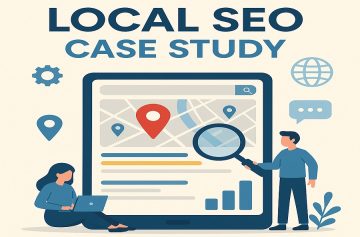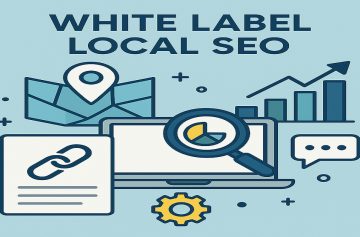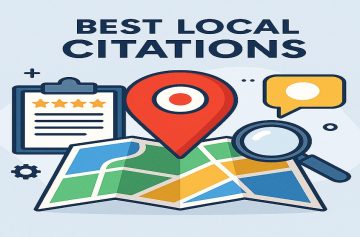Discover the key benefits of local citations for boosting local SEO, online visibility, and business credibility.
What Are Local Citations?
Definition and Examples
Local citations refer to any online mention of your business’s Name, Address, and Phone number (NAP). These citations help people—and search engines—find accurate information about your business, especially when they’re searching for local products or services.
Examples of Local Citations:
- A business listing on Google Business Profile
- A directory listing on Yelp, Bing Places, or Yellow Pages
- Mentions in local blogs, news sites, or chamber of commerce directories
Even a simple mention of your business (without a link) can still count as a local citation if it includes NAP details.
How Citations Work in Local SEO
Citations play a key role in how search engines like Google evaluate your business’s relevance, authority, and trustworthiness in a local area. When your business information is consistently listed across reputable platforms, it signals to search engines that your business is legitimate and well-established.
Here’s how it helps your local SEO:
- Boosts your visibility in local search results
- Improves your chances of appearing in the Google Map Pack
- Reinforces your business’s presence when people search for relevant services near them
In short, citations help validate your business in the eyes of search engines and local customers.
Structured vs. Unstructured Citations
There are two main types of local citations: structured and unstructured.
Structured Citations
These appear in formal business directories and platforms designed specifically for listing business information. The NAP details are clearly formatted and organized.
Examples:
- Google Business Profile
- Facebook Business Page
- TripAdvisor
- Apple Maps
Unstructured Citations
These occur in places where your business is mentioned in a more casual or natural context. While they may not follow a strict format, they still include your NAP details and contribute to your local SEO.
Examples:
- Mentions in local blog posts
- Online newspaper articles
- Event listings or press releases
- Social media posts
Both types are valuable, but structured citations carry more weight in establishing your local presence, while unstructured citations support brand awareness and credibility.
Why Local Citations Matter for Your Business
The Role of NAP Consistency (Name, Address, Phone Number)
NAP consistency means that your business name, address, and phone number are exactly the same across all online platforms and directories. This might sound simple, but it plays a critical role in your local SEO success.
When your NAP information is consistent everywhere—from Google Business Profile to local directories and social media—search engines are more confident that your business is legitimate and reliable. On the other hand, even small differences (like “Street” vs. “St.”) can create confusion and weaken your credibility online.
Benefits of NAP consistency:
- Helps Google accurately connect all your online mentions
- Reduces the risk of losing potential customers due to outdated or incorrect info
- Increases your chances of ranking higher in local search results
In short, consistent NAP information builds a solid foundation for your local SEO strategy.
Influence on Google’s Local Search Algorithm
Google’s local search algorithm takes several factors into account when ranking local businesses—and citations are one of them. The more high-quality and consistent citations your business has, the stronger your local presence becomes in the eyes of Google.
Here’s how citations influence your ranking:
- Relevance: Citations tell Google what your business does and where it’s located
- Prominence: The number and quality of citations contribute to how well-known your business appears to be
- Trustworthiness: Consistency across the web signals that your business is real and reputable
By optimizing your citations, you give Google more reasons to show your business in the local pack (those top 3 local results with the map), which often gets the most clicks.
Building Trust with Search Engines and Customers
Trust is a key factor in both SEO and customer decision-making. Local citations help build that trust by presenting your business consistently and professionally across the internet.
For search engines, accurate citations confirm your business details and reduce the chances of misinformation. This makes it easier for them to index and display your business correctly.
For customers, seeing the same name, address, and phone number across multiple trusted platforms gives them confidence that your business is legitimate and easy to contact. This can directly impact your:
- Click-through rate (CTR)
- Phone inquiries and walk-in traffic
- Online reviews and reputation
When customers trust your information, they’re more likely to engage—and that’s exactly what search engines want to see.
10 Key Benefits of Local Citations for Local SEO
1. Improves Local Search Visibility
Local citations increase the chances of your business appearing in local search results, especially when users are looking for services “near me” or in a specific area. When your business is mentioned on multiple trusted directories and platforms, it signals to search engines that you are relevant to local queries. The more visible you are, the more opportunities you have to attract new customers.
2. Boosts Google Maps Rankings
Citations—especially on platforms like Google Business Profile, Yelp, and Apple Maps—play a significant role in improving your Google Maps presence. Accurate and consistent listings help Google verify your location and business details, increasing your chances of being featured in the coveted Local Map Pack, which often appears at the top of local search results.
3. Enhances Online Authority and Trust
Consistent citations on reputable sites act as “trust signals” for both search engines and potential customers. When your business is listed on well-known platforms, it shows that you’re a credible player in your industry. This not only improves your domain authority but also makes people more comfortable engaging with your brand.
4. Increases Website Traffic
Many citation sites allow you to add your website link. When users find your listing and click through to your site, it results in referral traffic—people who are actively interested in your products or services. More traffic from relevant sources often leads to better conversion rates and more engagement on your site.
5. Generates More Qualified Leads
Local citations help attract leads who are already looking for what you offer in your specific area. These are high-intent users—they’re more likely to call, visit your store, or request a quote. Since citations often include details like business hours, services, and location, they help pre-qualify potential customers before they even reach out.
6. Builds Business Reputation through Consistency
When your NAP information is consistent across the web, it strengthens your business’s reputation. Customers are more likely to trust a company that appears professional, organized, and easy to contact. This consistency also reduces confusion, ensuring potential customers always get the right information.
7. Strengthens Brand Awareness in Local Areas
Every time someone comes across your business in a directory, blog, or local website, your brand gets exposure. Even if they don’t take action immediately, these touchpoints help build recognition. Over time, people start to remember your name, logo, and services—which is crucial in competitive local markets.
8. Helps Outrank Local Competitors
If your competitors are not actively managing their citations, you have a strong advantage. By ensuring your listings are accurate and spread across high-authority sites, you improve your chances of ranking above them in both local search and Google Maps. A well-managed citation strategy can be the edge that puts you ahead in local SEO.
9. Encourages Customer Reviews
Many citation platforms, like Google and Yelp, also host customer reviews. Having your business listed encourages satisfied customers to leave positive feedback. Not only do reviews boost your credibility, but they also influence local rankings and drive more traffic to your listing—and eventually your store or website.
10. Supports Multi-Location Businesses
For businesses with multiple locations, citations help each branch get discovered locally. By creating accurate and optimized listings for each location, you make it easier for local customers to find the nearest outlet. This boosts individual location visibility and allows you to compete effectively in multiple areas.
How to Build Effective Local Citations
List of Top Citation Sites (Google, Yelp, Bing, etc.)
Getting listed on high-authority citation sites is the first step to building a strong local presence. These platforms are trusted by both users and search engines, which means they can significantly improve your local SEO performance.
Here are some of the most important citation sites you should prioritize:
- Google Business Profile – The most crucial platform for local visibility and appearing on Google Maps.
- Yelp – Widely used for business reviews and trusted by search engines.
- Bing Places for Business – Microsoft’s version of local listings, integrated with Bing Maps.
- Apple Maps – Essential for iPhone and Siri users looking for businesses near them.
- Facebook Business Page – Helps you reach local audiences and boost visibility via social media.
- Yellow Pages (YP.com) – Still relevant for local directory traffic and SEO signals.
- Foursquare – A popular app that also feeds business data to other platforms.
- TripAdvisor – Ideal for businesses in travel, hospitality, and tourism.
Being present on these platforms ensures your business is visible wherever your customers are searching.
Tips for Ensuring NAP Consistency
NAP (Name, Address, Phone number) consistency is the foundation of effective local citations. If your details are even slightly different across platforms, it can hurt your local rankings and confuse potential customers.
Here are a few best practices to maintain consistency:
- Use the exact same format for your business name, address, and phone number on every platform.
- Avoid abbreviations or variations (e.g., “Street” vs. “St.” or “Co.” vs. “Company”).
- Update listings immediately when you move, change numbers, or rebrand.
- Use a central document to store your official NAP details and refer to it whenever you create new listings.
- Regularly audit your existing citations to find and fix inconsistencies.
Maintaining accurate information not only helps with SEO but also improves customer experience.
Tools for Managing Citations (e.g., BrightLocal, Moz Local)
Managing local citations manually can be time-consuming—especially if you have multiple locations or dozens of listings. Thankfully, there are tools that can simplify and automate the process.
Here are some trusted citation management tools:
- BrightLocal
Helps you find, track, and fix citations across hundreds of directories. Offers citation audits and submission services. - Moz Local
Distributes your business info to key directories and helps maintain consistency with real-time updates. - Yext
A powerful enterprise-level tool that allows for bulk updates and real-time control across many platforms. - Whitespark
Specializes in citation building and offers a local citation finder tool for identifying opportunities. - SEMrush Listing Management
Provides a simple way to sync business info across top directories from one dashboard.
These tools help you save time, reduce errors, and ensure your business is accurately represented across the web.
Common Mistakes to Avoid with Local Citations
Inconsistent Information Across Listings
One of the biggest mistakes businesses make is having different versions of their Name, Address, and Phone number (NAP) across various platforms. Even minor inconsistencies—like spelling variations or outdated phone numbers—can hurt your local SEO performance.
Why it matters:
Search engines rely on consistency to verify your business’s credibility. When they find conflicting details, it creates confusion and may lead to lower rankings or incorrect listings.
How to avoid it:
- Double-check every citation for accuracy before submitting.
- Use the same formatting for all listings.
- Regularly audit your citations and update any incorrect info.
Consistency builds trust—not just with Google, but with your potential customers as well.
Using Low-Quality Directories
Not all directories are created equal. Submitting your business information to spammy, irrelevant, or outdated directories can do more harm than good.
Why it matters:
Low-quality directories might have poor SEO practices, lack moderation, or be flagged as untrustworthy by search engines. Associating your business with them could hurt your site’s authority or even lead to penalties.
How to avoid it:
- Focus on high-authority, well-known directories like Google, Yelp, Bing, and Apple Maps.
- Avoid sites with low traffic, excessive ads, or questionable content.
- Use tools like Moz or BrightLocal to identify reputable directories in your niche or region.
Quality over quantity is key when it comes to citation building.
Ignoring Review Opportunities
Many citation platforms, like Google Business Profile and Yelp, also allow customers to leave reviews—and overlooking this feature is a missed opportunity.
Why it matters:
Reviews build social proof, improve your online reputation, and can even influence your local search rankings. Search engines consider review quantity, quality, and recency when determining your credibility.
How to avoid it:
- Encourage happy customers to leave reviews on your citation listings.
- Monitor and respond to reviews regularly to show engagement and professionalism.
- Make it easy by including direct links to review pages in follow-up emails or thank-you messages.
Actively managing your reviews not only boosts trust but also adds a strong layer to your local SEO strategy.
Final Thoughts on the Power of Local Citations
Recap of Key Benefits
Local citations are more than just online listings—they’re a powerful asset in your local SEO strategy. When used effectively, they can:
- Improve your local search visibility
- Boost your presence on Google Maps
- Enhance your business’s trust and authority
- Drive more website traffic and phone calls
- Generate high-quality, local leads
- Strengthen your reputation through consistency
- Increase brand awareness within your community
- Help you stand out against local competitors
- Encourage positive customer reviews
- Support growth for businesses with multiple locations
Simply put, citations connect your business with the right audience at the right time—when they’re ready to take action.
Encouragement to Take Action for Local SEO Growth
If you’re serious about growing your business locally, now is the time to prioritize local citations. Whether you’re just getting started or need to clean up existing listings, taking control of your citation strategy can make a big difference in how your business performs online.
Start with the essentials:
- Claim and optimize your Google Business Profile
- Ensure NAP consistency across all platforms
- Build citations on trusted directories
- Use tools to manage and monitor your listings
- Don’t forget to encourage reviews and engage with your audience
Remember, local SEO isn’t just about rankings—it’s about being found by real people in your area who need your services. And local citations are one of the most effective (and often overlooked) ways to make that happen.
Let me know if you’d like me to:
- Compile the entire blog post into a single formatted document for publishing,
- Add a meta description, slug, or internal linking recommendations,
- Or help you repurpose this into social media content or a lead magnet.








Add comment